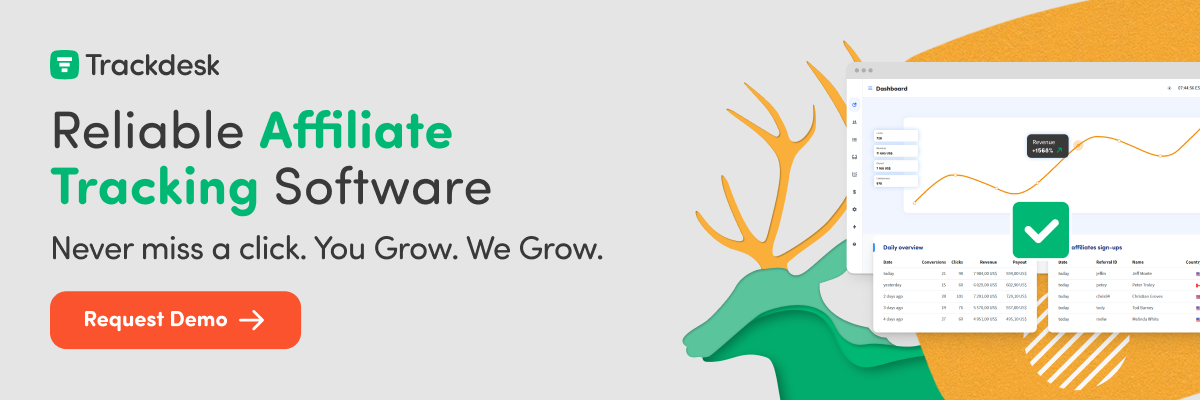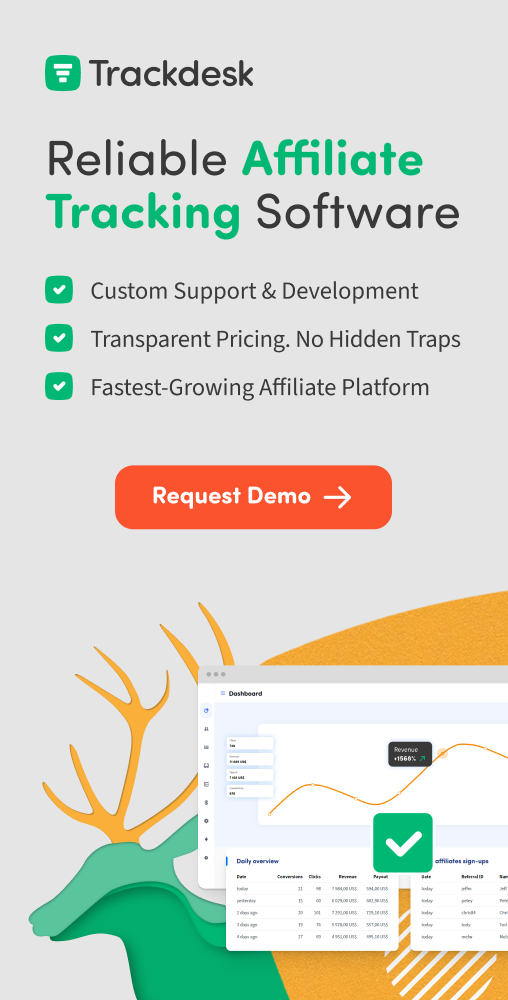Affiliate Tracking: What It Is and How To Do It Right
Tracking is a must if you want to succeed in affiliate marketing. Learn everything you need to know to ensure you do it right.
With today’s highly competitive online business landscape, it comes as no surprise that more and more business owners are starting affiliate marketing programs. This allows owners to collaborate with various partners with a strong online presence in order to gain site traffic, clicks, purchases, and, of course, profit.
However, the world of affiliate marketing programs can be confusing, especially for those encountering it for the first time. There are several aspects of affiliate marketing that you’ll need to learn about—one of which is affiliate tracking. Using reliable tools to track affiliates can enable you to monitor affiliate performance, prevent fraud, offer affiliate discount coupons, target devices, and ultimately drive business growth and development.
What is Affiliate Tracking?
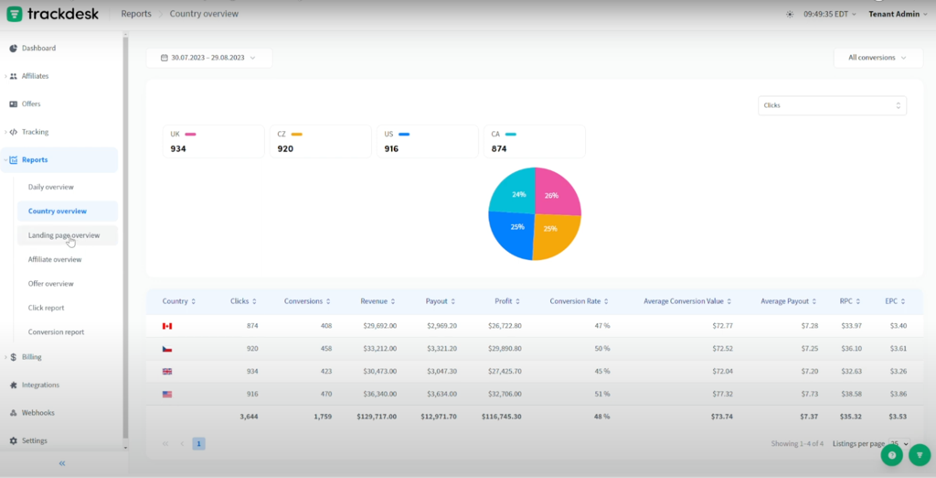
Source: Launch your free affiliate program for your business with trackdesk
Affiliate tracking is the process of monitoring and controlling affiliate marketing activity and site performance. This practice provides essential data for business owners, especially regarding site visits, conversions, traffic, and clicks.
This kind of information is crucial for owners and advertisers, as it gives them an avenue to create data-driven campaigns and optimise marketing strategies to ensure their effectiveness. As of 2023, over 42% of marketing and sales leaders have reported allotting 10-25% of their budget to partnerships—a testament to the prowess of affiliate partnerships.
This process is sometimes done by website add-ons; however, business owners usually opt for affiliate tracking software for more efficient and systemised tracking.
Generally, affiliate tracking works by capturing page views, clicks, conversions, and other data that are obtained through an affiliate partner, most commonly through the use of cookies, which are sets of information about site visitors. Cookies include location, time spent on the site, number of site clicks, and previously visited sites. Site owners get access to this information once the visitor clicks “Accept Cookies,” usually through a website pop-up.
In affiliate tracking, each affiliate partner has a specific affiliate ID and referral link. When a user uses these links, the affiliate ID is included in that user’s cookies. Thus, when a customer purchases a product or completes any business action, like creating an account, on the site using an affiliate link, the action is attributed to the affiliate partner.
The information parameters that cookie tracking could acquire used to be broader, as storing more detailed information about a user’s characteristics or even their preferred payment methods was allowed.However, due to the GDPR legislation passed in May 2018, most affiliate marketing methods have been limited to basic information to respect data privacy. Still, cooking tracking can be reliable in tracking Personal Identifiable Information (PII), as long as the user gives consent.
Aside from cookie tracking, there are several other types of affiliate tracking, which we’ll discuss in more detail later.
The Importance of Proper Affiliate Tracking
There’s much more to affiliate tracking than providing essential information to online business owners. Affiliate tracking also:
- Provides deeper insights – At the end of the day, marketing is all about data. With proper affiliate tracking, business owners receive thorough information about their target audience and advertising networks, which allows them to understand the market more comprehensively.
- Enhances productivity – Through the use of affiliate tracking software and tools, business owners have the benefit of enhancing productivity by streamlining their affiliate marketing programs.
- Saves time and money – Since productivity is boosted with affiliate tracking, business owners can enjoy spending less time and money on affiliate marketing efforts and focus more on optimising campaign efforts.
- Improves marketing campaigns – Affiliate tracking allows business owners to craft and implement optimal, data-driven campaigns thanks to the knowledge and insights that affiliate tracking provides. Proper affiliate tracking can also help these owners identify and reach out to the right affiliate partners to boost marketing efforts further.
- Drives business growth – When affiliate marketing programs are done right, business development is guaranteed—not just in terms of clicks and site visits but also in sales and revenue. In other words, proper affiliate tracking is a must-have in today’s e-commerce landscape.
Which Affiliate Tracking Method Is Right for You?
With the ever-changing landscape of technology development and privacy regulations, tech companies had to develop multiple affiliate tracking methods to help business owners and advertisers collect the right kind of information.
Here are seven different affiliate tracking methods you can consider for your own business or brand:
- Cookie Tracking
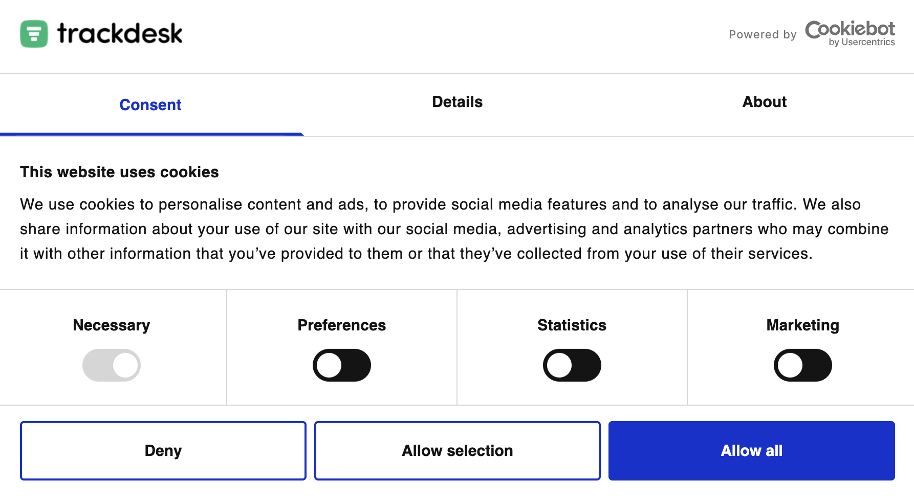
Cookie tracking is the primary affiliate tracking method, which is evident in how most online users have encountered a cookie acceptance pop-up when visiting websites. Using a cookie banner generator helps businesses easily design these pop-ups while staying compliant with data protection laws. Through this method, business owners can receive general information like clicks, shopping preferences, and search history. However, they have become less reliable now compared to other affiliate tracking methods.
Pros: Can improve website experience, aids in targeted advertising
Cons: Less reliable after the GDPR legislation
- Action Tracking
Action tracking is exactly what it sounds like. This feature follows a user's actions on the website they visit or captures their responses to a published ad, thus providing valuable customer behaviour data throughout the stages of the buyer journey. Site owners, for instance, can determine if a user clicked a link, watched a video until the end, read product description, or visited a recommendation tab.
Pros: Provides essential information on customer behaviour and journey
Cons: Ad blockers and other technical limitations can skew action data
- Impression Tracking
Impression tracking is a bit like action tracking in that it provides data for every ad or link shown to the site visitors. However, impression tracking also includes data on ads or links that visitors rejected or passed on, which gives valuable insights into improving ads or optimising copies.
Pros: Provides crucial data on how to optimise ads and links
Cons: Ad blockers and other technical limitations skew impression data
- Lifetime Commissions
Lifetime commissions are affiliate tracking methods that allow affiliate partners to benefit indefinitely from referrals. When an affiliate successfully drives a customer to your website, all subsequent conversions or purchases made by the referred customer will also be partially credited to the affiliate partner regardless of whether the customer uses a different referral link or device. Thus, this feature is a great way to help business owners gain and retain affiliate partnerships.
Pros: Incentivises affiliate partners
Cons: Not offered by all software types
- Offline Tracking
Offline tracking commonly refers to the generation of coupon codes or discounts given to specific affiliate partners and campaigns. When used, affiliate tracking software can automatically detect which affiliate to create provisions for.
Pros: Works offline, highlights specific products, encourages conversion
Cons: Misuse of codes can impact tracking accuracy
- Per Product Tracking
This affiliate tracking method is best for business owners with varying affiliate commission tiers. As its name states, each product is tracked independently to allow business owners a comprehensive view of which products and affiliates perform well.
Pros: Allows owners to determine best-performing products and optimise campaigns accordingly; great for those with several online stores
Cons: None
- Postback URL Tracking
Postback URL tracking has been slowly growing in popularity, largely because it has been hailed as one of the most accurate affiliate tracking methods. This is because it works on a server-to-server basis that allows the advertiser to store necessary information without the need for any other integrations.
Pros: Highly accurate, works across different devices, lower risks of errors
Cons: More technically complex, requires more resources than other tracking methods
Choosing the Best Affiliate Tracking Software
Utilising affiliate tracking software is the best way to go to get all the benefits of affiliate tracking. These tools help business owners streamline affiliate marketing campaigns in one all-encompassing platform.
Some examples of by tracking referrals, recommendations, and endorsements from affiliate partners and making them easily accessible and customisable.
Key Features of Affiliate Tracking Software
There are many different affiliate tracking software tools in the market, all with their own distinct features and services. Therefore, it is crucial to choose an affiliate tracking software that best fits your platforms, needs, and overall business goals.
For your reference, here are some of the key features a good affiliate tracking software must have:
- Multiple tracking options – As you now know, there are different types of tracking options aside from cookie tracking. A good affiliate tracking software should be able to handle different types of tracking options, especially if your business requires more than one type.
- Software flexibility – Each business has its own strategies and processes, so affiliate tracking software should be highly adaptable in order to cater to a wide array of brands and businesses. This feature also refers to how customisable the platform is to expedite the affiliate tracking process.
- Spot on reports – Accurate reporting is an absolute must in affiliate tracking, especially since owners will have to deal with large amounts of user information and data. A proper affiliate tracking software should be able to provide detailed reports to help you and your team strategise and optimise affiliate marketing further.
- Fraud detection feature – Affiliate tracking is by no means perfect, and there may be instances where affiliate partners may attempt to commit fraud to earn commissions. As such, affiliate tracking software should provide detailed fraud detection techniques to protect your business from financial leaks.
- Excellent customer support – Encountering obstacles when using affiliate tracking software is always possible. Before choosing the affiliate tracking software for your business, make sure that the platform provides efficient and solutions-driven customer support availability that can help you reach your affiliate tracking goals.
Aside from these features, business owners should also consider other factors when choosing an affiliate tracking software, such as budget and resource availability. This next section can help you determine important factors in choosing an affiliate tracking software further.
Top Affiliate Tracking Software
After identifying the affiliate tracking methods suited for your business and determining which services your business needs, the next step is to choose the right affiliate tracking software for you. Nowadays, this can be a very challenging task—especially since there are so many different affiliate tracking software in the market.
To help you get started, we’ve listed some of the top-ranked affiliate tracking software:
- trackdesk
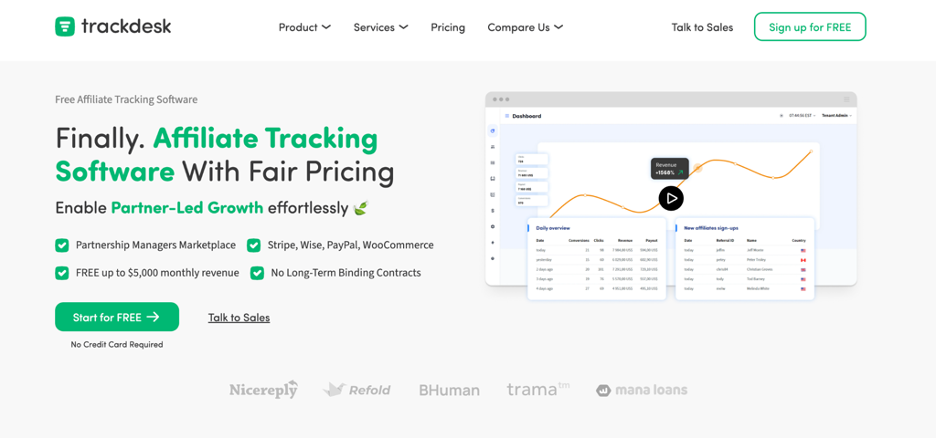
trackdeck boasts an all-in-one tracking software with hundreds of features in reliable tracking, affiliate payouts, real-time analytics, affiliate management, and user experience. Compared to other affiliate tracking software, trackdesk also provides unlimited campaigns, affiliate partners, and tracking requests—all at a more affordable and business-friendly payment structure.
- Impact
Impact provides TrueLink™, a unique feature that optimises user experience by allowing owners to give affiliate partners direct links to the business website without the need for any other kind of integration. Aside from that, Impact offers multiple affiliate tracking methods and other key features to help manage, protect, and streamline affiliate partnerships.
Pros: Comprehensive suite of tools, user-friendly interface
Cons: Complex pricing structure, no free trials, not fit for small to medium businesses
- PartnerStack
PartnerStack’s company mission is to unlock the power of partner ecosystems for B2B SaaS—and they do so with a simplified, automated affiliate tracking system. At PartnerStack, you can recruit, activate, track, reward, and optimise all from one platform. This empowers both business owners and affiliate partners to optimise performances and increase the chance for success.
Pros: Flexible, user-friendly interface, professional and clean affiliate URLs
Cons: Poor customer support, limited payment options
- Tapfiliate
Tapfiliate is one of the most trusted one-stop shops for affiliate tracking. Aside from providing key features of affiliate tracking software, Tapfiliate offers access to the Admitad Partner Network, which has over 100,000 active publishers you can connect with to promote your business.
Pros: User-friendly interface, customisable reports, great for basic integrations
Cons: Requires a slight learning curve; some features are limited
- Refersion
Refersion prides itself on being a user-friendly and effective affiliate management platform, especially for Shopify users. One of its key features is its Post-Purchase Channel Tool, which automatically lists customers as affiliates in order to help businesses build their own roster of possible affiliates quickly and more efficiently.
Pros: Great for affiliate management, wide integration options, easy to set up
Cons: Interface can be more user-friendly, delays in customer support
Final Thoughts
Like with any other marketing effort, it will take a bit of time to reap the benefits of affiliate tracking. But once the results start pouring in, we guarantee you won’t regret taking the leap and starting your own affiliate marketing program.
Affiliate tracking truly has the potential to step up your e-commerce game, especially if you use trackdesk as your affiliate tracking software. Not only does it offer business-friendly pricing structures, but it also offers a wide variety of features and services to elevate your affiliate marketing prowess. Sign up now to launch your own affiliate program today.

I have a passion for storytelling. I believe that a good story delivers value while capturing, influencing, and sustaining its intended audience. This has always been, and always will be, my primary aim as a writer.
